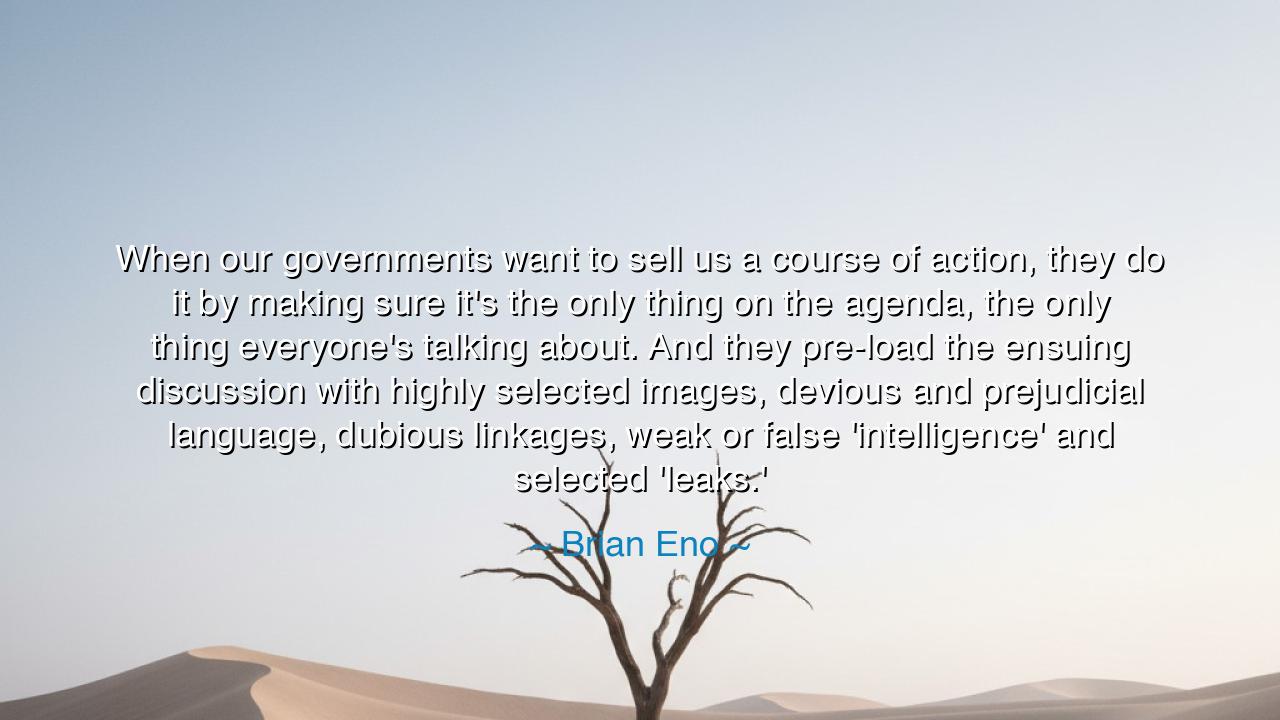
When our governments want to sell us a course of action, they do
When our governments want to sell us a course of action, they do it by making sure it's the only thing on the agenda, the only thing everyone's talking about. And they pre-load the ensuing discussion with highly selected images, devious and prejudicial language, dubious linkages, weak or false 'intelligence' and selected 'leaks.'






“When our governments want to sell us a course of action, they do it by making sure it’s the only thing on the agenda, the only thing everyone’s talking about. And they pre-load the ensuing discussion with highly selected images, devious and prejudicial language, dubious linkages, weak or false ‘intelligence’ and selected ‘leaks.’” – Brian Eno
In this piercing and prophetic reflection, Brian Eno, the musician, thinker, and cultural philosopher, lifts the veil from one of the oldest arts of power: the manipulation of perception. His words burn with quiet indignation, warning us that the most dangerous chains are not made of iron, but of ideas carefully arranged. When he speaks of governments that “pre-load the discussion,” he reveals a subtle truth — that control is not always enforced through violence or decree, but through the shaping of thought itself. To make something the “only thing everyone’s talking about” is to narrow the vast field of the human mind to a single corridor, to guide entire populations not by truth, but by suggestion.
The origin of this quote lies in Eno’s reflections on modern propaganda, particularly in the wake of the early 21st century’s wars — moments when nations were swept into conflict not by reasoned deliberation, but by orchestrated emotion. He saw how language, imagery, and ‘intelligence’ were used not to enlighten, but to persuade. The agenda is set before the people realize there was ever a choice to make. In the ancient world, the tyrant ruled by sword and terror; in the modern one, he rules by narrative. And Eno, ever the artist of perception, recognized that in a world saturated by media, the battle for the mind is the battle for freedom itself.
The ancients understood this craft well. The philosopher Plato warned in his Republic that those who control the stories told to the people shape the destiny of the state. For stories are not mere words — they are the vessels of meaning through which societies understand themselves. When rulers select which images the people see, which words define the debate, and which facts are emphasized or buried, they mold not just opinion, but reality. The crowd believes it is choosing, yet its choices were framed long before it spoke. This is the essence of Eno’s warning — that to pre-load a discussion is to command its outcome, for the boundaries of thought have already been drawn.
Consider the history of the Iraq War, when the phrase “weapons of mass destruction” echoed endlessly across the airwaves, repeated until it became an unquestioned truth. The images of fear, the language of urgency, and the carefully chosen leaks of intelligence created a tide that swept reason away. The people did not vote for war so much as they were carried toward it by a river of narrative from which no other course seemed possible. Only later, when the fog lifted, did they see that the evidence was weak, the intelligence false, and the consequences irreversible. Thus Eno’s observation becomes not an abstraction, but a record of how truth can be bent into obedience.
Yet Eno’s tone is not only one of condemnation, but of awakening. His words call us to vigilance of the mind — to remember that freedom is not merely political, but perceptual. The wise must learn to see beyond the surface of things, to question the origin of every image and the intent behind every word. He urges us to understand that propaganda thrives on passivity, and that the act of thinking critically is itself a form of resistance. When you question the story you are told, you reclaim your sovereignty. When you listen to the silence between the headlines, you rediscover the truth that manipulation seeks to bury.
In this, Eno’s message mirrors that of the ancient historian Thucydides, who chronicled how demagogues in Athens stirred the people into ruin by flattering their fears. Thucydides wrote that “the truth was the first casualty,” and so it remains. But Eno, as an artist, believes still in the power of imagination as liberation. For just as propaganda confines thought, art can reopen it. Where propaganda narrows the possible, art expands it — restoring to humanity the capacity to dream freely and to think beyond imposed limits.
So let this teaching be passed down: Guard your mind as you would guard your freedom. Do not let others choose your questions for you. Seek the truth behind every spectacle, and remember that what is loudest is often least true. Cultivate the discipline of skepticism, not as cynicism, but as care for your own clarity. For the wise citizen is one who listens not only to what is said, but to what is omitted; who follows not the crowd, but the conscience. Only then can we resist the soft tyranny of engineered consent.
And thus, as Eno reminds us, though power may seek to confine the world to a single story, the human spirit must remain vast, curious, and defiant — forever capable of seeing through illusion, and dreaming beyond it.






AAdministratorAdministrator
Welcome, honored guests. Please leave a comment, we will respond soon